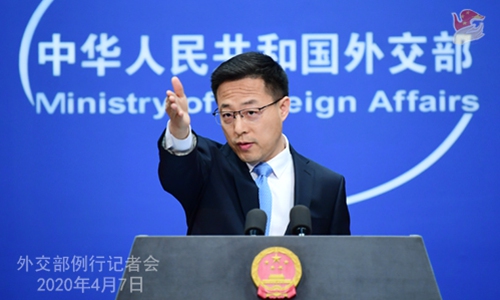China's diplomatic challenges in a world polarized by the pandemic
Source:Global Times Published: 2020/5/10 19:43:41

Foreign ministry spokesperson Zhao Lijian is making remarks at a press briefing on April 7. Photo: Ministry of Foreign Affairs
Editor's Note:
Like it or not, the novel coronavirus has already been politicized. A growing number of observers from across the world have been talking about how it will change the global order. How should we digest relevant questions, discussions and trend resulting from the pandemic? What is China's diplomatic situation against the backdrop? The Global Times collected views from four experts during an online forum over the topic held by Renmin University of China on Friday.
Liu Yuanchun, vice president of Renmin University of China
The COVID-19 pandemic has brought several unprecedented changes to the global economy.
First, several major economies have plunged into a deep recession that is more serious than the aftershocks of the financial crisis of 2007-08.
Second, each country has taken extraordinary efforts and bailout plans to save their economy from the outbreak. Overall, developed nations, represented by the US and European countries, have adopted a series of relief policies such as zero interest rate, quantitative easing and large-scale fiscal stimulus. These measures are more aggressive than those adopted after the 2008-09 financial crisis.
The third unprecedented change is the emerging phenomenon of negative prices of commodities, especially crude oil.
Against the backdrop, many believe that COVID-19 has ushered the world into a new era. Yet it is still too early to draw the conclusion.
The pandemic is more like an accelerator of global changes, rather than an inflection point of the current global economic order.
Existing trends of populism and nationalism have heightened conflicts between great powers and anti-globalization, but the trends are not new. They have existed for some time now. The global distributions of labor and interests have not been turned upside down because of the pandemic.
Shi Yinhong, director of Renmin University's Center for American Studies
Certain dimensions of China's diplomacy so far in the pandemic are worth paying attention to.
The materially and psychological decoupling between China and the US has been catalyzed by the outbreak, most notably with multiple disruptions in industrial supply chains, and drastic cuts in international travel between the two sides.
Trump and his super-hardcore aides are seeking a complete disconnect from China in key sectors of global supply chains.
Additionally, hostility against China from Australia and India, though not as severe as that from the US, is arising on lockstep with the Trump administration. French President Emmanuel Macron and some British politicians have made public innuendo against China, and Germany has also asked China for answers over the origins of the coronavirus.
Some observers say China is facing chances of filling a global leadership vacuum left by the US. But the truth is, China's soft power, available resources and experience are fairly limited to do so. A world without leadership will highly likely emerge.
Wu Xinbo, dean of the Institute of International Studies at Fudan University
Unlike China, which helped the US during the last financial crisis, the US has not offered any constructive assistance to China to deal with the coronavirus when it broke out.
US' response stemmed from its own political needs and strategic calculations. The US gloated over China's epidemic at the beginning, and viewed COVID-19 as a good opportunity to weaken China's strength. It initiated a China-bashing campaign and repeatedly asked China to compensate for the damages incurred due to the US' own failures to contain the virus.
In years to come, three trends in China-US relations can be anticipated.
Economic and trade ties between China and the US will further weaken. The US will attempt to readjust its industrial chain and continue to strengthen its technological blockade against China.
Although the US is unwilling to play a leading role, it definitely will prevent China from taking on a higher international position.
The competition between the two in respect of national governance systems and capabilities will become more pronounced. The pandemic is making some Americans ponder how to compete with China's national governance in the future.
Feng Zhongping, director of European Studies at the China Institutes of Contemporary International Relations
As US' China policy is becoming increasingly tough, Europe is also adjusting its China policy. Europe has three emerging international challenges: China's rise, an unreliable US, and Russian pressure with the annexation of Crimea.
European politicians have been discussing what China's rise means to the continent. According to EU-China - A strategic outlook, issued by the European Commission in March 2019, China is not defined by the EU in a simple way. It is a strategic partner on climate change and the clean energy transition; an economic competitor in the pursuit of technological leadership; and a systematic rival promoting alternative models of governance. This is the first time that the EU has described China as a rival since their diplomatic relations were established in 1975.
The deadly COVID-19 pandemic further reinforces the consensus reached in 2019 EU-China - A strategic outlook that China is a partner, a competitor, and a systematic rival to the EU.
That being said, there will be no fundamental change in Europe's tone of both precaution and cooperation with China, and Europe will not take sides between the two giants - China and the US.
Posted in: VIEWPOINT